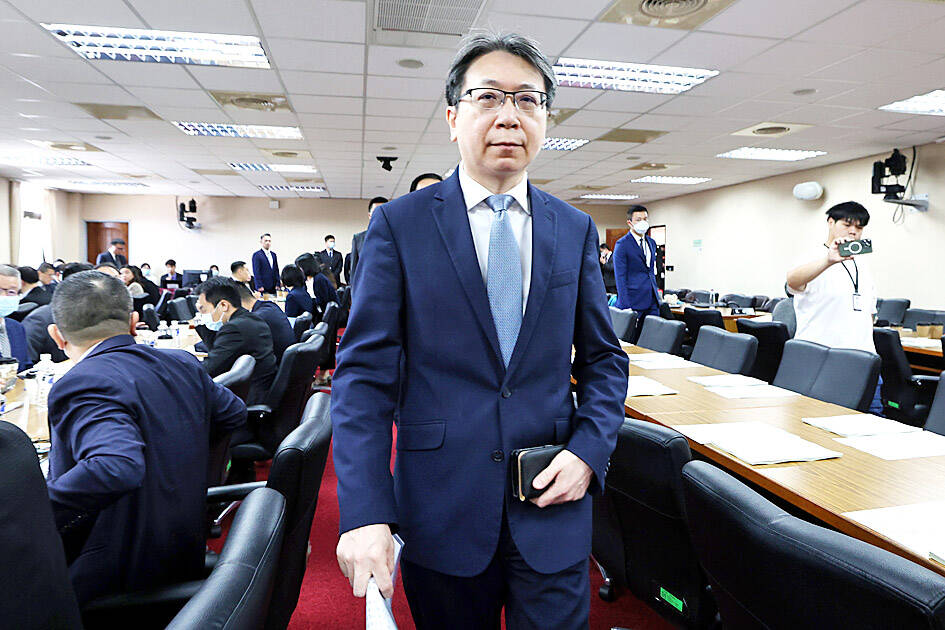Beijing’s widened anti-espionage legislation is likely to pose heightened risks to Taiwanese visiting or transiting through China, National Security Bureau Director-General Tsai Ming-yen (蔡明彥) said yesterday.
The amended Counterespionage Law, which was passed by the Chinese National People’s Congress on Wednesday last week and is to take effect in July, would have an impact on the safety of Taiwanese in China, Tsai told lawmakers at the Legislative Yuan in Taipei.
The legislation broadens the definition of spying to encompass being affiliated with “surrogates” of foreign intelligence agencies, “Internet-based espionage” and “activities that affect China’s economic interests,” he said.

Photo: CNA
These developments are worrying for Taiwanese entrepreneurs, journalists and human rights advocates visiting or transiting through China, and could cause cross-strait relations to deteriorate, Tsai said.
Former military service members, civil servants, and former and current members of civic groups should be aware that their smartphones or other electronic devices could be searched by Chinese customs officials for incriminating images or texts, he said.
People could face legal repercussions for things they have done or said outside of China’s jurisdiction, he told legislators.
Beijing’s strategy of facilitating unification through cross-strait exchanges conflicts with its efforts to retain its hold on power by regulating interactions among Chinese, which would make dealing with China more fraught for Taiwanese, he said.
An official familiar with the matter said that the amended law’s definition of spying can include speaking negatively about China on the Internet, conducting a public opinion survey, or taking cellphone pictures of rare earth mining sites.
Being overly solicitous to representatives of China’s state-owned enterprises, hiring former employees of Chinese businesses, visiting Xinjiang or Tibet, or drawing a map for personal use could lead to criminal charges, the official said on condition of anonymity.
Taiwanese business owners could face false accusations of spying from their competitors, they added.
China’s counterespionage act — which appeared to have been written to target foreign nationals — empowers authorities to define almost any undesirable activity as spying, National Cheng Kung University political science professor Hung Chin-fu (洪敬富) said.
The legislation is likely to have far-reaching consequences for China, including scaring off potential investors and sparking a capital flight from the country, he added.

The CIA has a message for Chinese government officials worried about their place in Chinese President Xi Jinping’s (習近平) government: Come work with us. The agency released two Mandarin-language videos on social media on Thursday inviting disgruntled officials to contact the CIA. The recruitment videos posted on YouTube and X racked up more than 5 million views combined in their first day. The outreach comes as CIA Director John Ratcliffe has vowed to boost the agency’s use of intelligence from human sources and its focus on China, which has recently targeted US officials with its own espionage operations. The videos are “aimed at

STEADFAST FRIEND: The bills encourage increased Taiwan-US engagement and address China’s distortion of UN Resolution 2758 to isolate Taiwan internationally The Presidential Office yesterday thanked the US House of Representatives for unanimously passing two Taiwan-related bills highlighting its solid support for Taiwan’s democracy and global participation, and for deepening bilateral relations. One of the bills, the Taiwan Assurance Implementation Act, requires the US Department of State to periodically review its guidelines for engagement with Taiwan, and report to the US Congress on the guidelines and plans to lift self-imposed limitations on US-Taiwan engagement. The other bill is the Taiwan International Solidarity Act, which clarifies that UN Resolution 2758 does not address the issue of the representation of Taiwan or its people in

US Indo-Pacific Commander Admiral Samuel Paparo on Friday expressed concern over the rate at which China is diversifying its military exercises, the Financial Times (FT) reported on Saturday. “The rates of change on the depth and breadth of their exercises is the one non-linear effect that I’ve seen in the last year that wakes me up at night or keeps me up at night,” Paparo was quoted by FT as saying while attending the annual Sedona Forum at the McCain Institute in Arizona. Paparo also expressed concern over the speed with which China was expanding its military. While the US

SHIFT: Taiwan’s better-than-expected first-quarter GDP and signs of weakness in the US have driven global capital back to emerging markets, the central bank head said The central bank yesterday blamed market speculation for the steep rise in the local currency, and urged exporters and financial institutions to stay calm and stop panic sell-offs to avoid hurting their own profitability. The nation’s top monetary policymaker said that it would step in, if necessary, to maintain order and stability in the foreign exchange market. The remarks came as the NT dollar yesterday closed up NT$0.919 to NT$30.145 against the US dollar in Taipei trading, after rising as high as NT$29.59 in intraday trading. The local currency has surged 5.85 percent against the greenback over the past two sessions, central